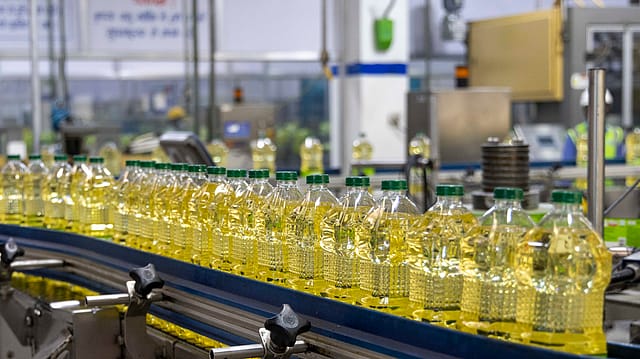Edible oil brands have cut prices by ₹10-15: Govt
ADVERTISEMENT

Timely government interventions on multiple fronts have led to a falling trend in edible oil prices, which will help in cooling the inflation as well, Department of Food and Public Distribution secretary Sudhanshu Pandey said.
"All major edible oil brands have cut prices by 10-15 rupees," Pandey said, adding that this has been possible due to constant monitoring by the department and constant engagement with all stakeholders.
The wholesale prices and retail prices of vanaspati, soyabean oil, sunflower oil and RBD palmolein have decreased over the week.
With the edible oil prices beginning to show a downward trend and are set to decline further, the Indian consumers can expect to pay less for their edible oils, says the Ministry of Consumer Affairs, Food & Public Distribution.
The maximum retail price (MRP) of Fortune Refined Sunflower Oil 1 litre pack has reduced to ₹210 from ₹220, the government said citing sources. The MRP of Soyabean (Fortune) and Kachi Ghani oil 1 litre pack from ₹205 to ₹195, it added.
The reduction in oil prices comes in the wake of the Centre reducing the import duty on edible oils making them cheaper.
The surprise inspections conducted by the department to check illegal stocking of edible oil also had a deterrent impact, Pandey said.
In Phase-I, 53 entities and Phase-II, 12 entities inspected were found to be defaulting on the Central Stock Control Order. The concerned state governments have been requested to take suitable action under the Essential Commodities Act, 1955 against the defaulting entities as per provisions made in the Act, the government says.
The government in May allowed import of crude palm oil, soyabean oil and sunflower oil at nil rate of customs duty for two years. The agri cess on these oils has been reduced to 5%.
The basic duty on refined soyabean oil and refined sunflower oil has been slashed to 17.5% from the current 32.5% and the basic duty on refined palm oil has been reduced from 17.5% to 12.5%. The government has extended the free import of refined palm oils for a period up to December 31, 2022.
This came after Indonesia's move to temporarily ban palm oil exports rattled global vegetable oil markets that were already coping with a shortage of sunflower oil due to the Russia-Ukraine war.
Palm oil imports account for more than half of India’s total imports in the vegetable oil segment. Indonesia supplies more than half of India’s edible oil imports.
The government was banking on palm oil imports after shipments of sunflower oil — which comprises 15% of most Indian edible oil brands — were hit due to the Russia-Ukraine war. Ukraine and Russia together account for 90% of India's sunflower oil imports. Soybean oil, which comprises 22% of India’s total edible oil imports, is bought mainly from Argentina and Brazil.